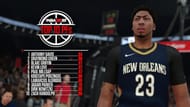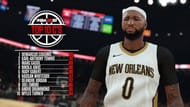NBA is much more than just performing on the court, it is all about how you look and how you can integrate that into your performance. NBA 2K19 not only integrates this aspect into the game but has really turned it up in terms of all aspects of the games. With more and more controls, the game has become more realistic than ever and has definitely solved some problems that the previous versions of the game had.
Seeing that the AI has become more advanced in terms of making sure that players get the ball within their positions, the playmakers bring the ball in and that the limitations of the players are also seen, it has become more and more important to have the right player builds at each position as it ensures the best possible combinations for seamless gameplay.
Here we list what the best build for each position is:
Explore the NBA Draft 2024 with our free NBA Mock Draft Simulator & be the GM of your favorite NBA team.
#1 Point Guard
Point guards are immediately associated with dribbling, passing and just overall ball handling skills. While these skills are important for your 2K19 PG to have, it is also important for them to have other qualities to compliment these basic abilities. Boosting stats such as speed steals and lateral quickness is absolutely necessary.
The apt mixing of attributes allows you to cut past defenders, get fast breaks and just stay in front of offensive players in general. Steals can lead to layups and therefore easy points. Beyond the abilities and subtypes, height, weight, and wingspan also affect how the players play.
This information will affect the outcome of the plays you make and should be taken into consideration while choosing a player. Weight affects speed and movements, height affects defense and so on. The average for a point guard is 6'3", 192lbs, and an 81.8" wingspan.
Point guards tend to be the smallest players on the court helping them with the agility they need. With 2K19 it won't hurt to make your PG shorter than the norm in terms of both height, weight and wingspan, thus pushing up their offensive capabilities. This, however, will decrease defensive capabilities, but what are the other four players for then?
#2 Shooting Guard

Shooting Guards do exactly as the name suggests, they shoot. To get some easy, quality points its important to boost the 3-point shooting abilities of the shooting guards. The aim is to create a player with a build that has a decent range, thus they can find themselves open outside the 3-point line and get some good 3's in.
Ideally, this kind of player can get good 18-25 points a game. Once this is set you can build on other attributes. In terms of height, weight, and wingspan, shooting guards are a mix of tall and short players. The tall ones are better at defense and rebounds but the smaller ones are better at moving and driving.
Weight also reflects similarly on stats. Wingspan is also important for shooting guards according to what the team wishes to achieve from their presence. Shooting guards tend to be approximately 6'4", 198lbs, and what a wingspan of 82.9".
From here to get a better and faster shooter, make the players a little shorter in terms of height and wingspan. If you are looking for a more defensive player, push up the weight.
#3 Small Forward

While building small forwards it is important to pour in attributes towards being highly athletic and competitive. For this, attribute points need to go into strength, speed, and acceleration. Once the players are able to keep up with the game in terms of stamina and physical progress it becomes easier for them to start scoring easy points.
Coming to height, weight, and wingspan, these are integral to the type of small forward you are trying to create. Especially, height is very important as taller players are more defensive and on the other hand, the shorter players are better with ball handling and speed.
Small forwards start at around 6'8", 222 lbs and a wingspan of about 87.2". Thus, making them both taller and heavier than point guards and shooting guards. This seems a little out of the ordinary, but there are not many changes you need to make to this basic formula.
The all-around average allows players to do well in all of their roles. Small forwards are integral in keeping the team together, so they need to be capable in all fields.
#4 Power Forward

Now, the goal for a power forward will always be to create a virtual version of Anthony Davis. The most important skill sets to boost to achieve this are vertical, quickness and speed. This combination has proven to be successful in putting your gameplay far ahead of the competition.
The combination also gives you more shooting prowess as it becomes harder to box such players out. The vertical also allows for easy rebounds and once these are well boosted it also helps to boost the scoring ability to be able to collect high stats easily.
Now in terms of shape and size, power forwards are most likely to encounter the most variety in terms of opponents. Choosing the height and weight solely depends on what you expect from the player and filling in the gaps of what your team needs. Overall though it is always seen as a plus for power forwards to have a large wingspan.
Power forwards start at an average height of 6'10", 238 lbs and a wingspan of 89.4". Ideally, it is always good to increase height and wingspan to improve defensive stats and dunking abilities. Overall this combination will allow for a well rounded and powerful power forward.
#5 Center

Having a killer player at the center may be the most important position for a strong team. It is super important to have great defense from a center player as teams will try and drive in and feed early in the game capitalizing on a weak center.
To avoid this it is important to put points into building stats and rebounding skills. This is the best way to be able to hold your ground inside the paint. Unlike the variations that the other four positions see, Center's have a very clear type.
This player is always the biggest, tallest, scariest person on the court. Height, weight, and wingspan are most important while building this position. The average height for a center starts at 7'0", weight at 225 lbs and wingspan at 93.8".
To enhance this already killer set up, it is good to choose a slightly taller height as well as a bit of a heavier weight and extended wingspan. This combination will help strength, boxout ability, and strong defense.